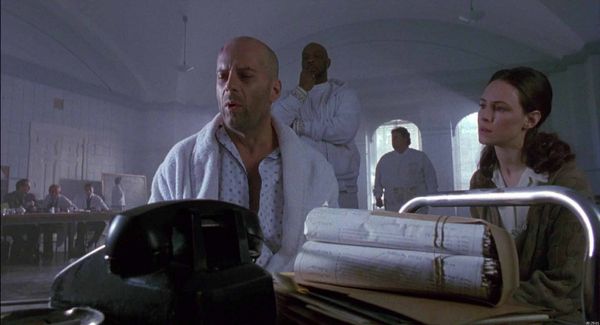Eye For Film >> Movies >> Twelve Monkeys (1995) Film Review
Twelve Monkeys
Reviewed by: Jennie Kermode

It's 2035. The world, as we are thrust into it, is a mess; as our hero crawls up from the subterranean environment where humanity ekes out a living, we share his shock at the devastation he sees. Disease has wiped out almost everyone. Now James Cole (Bruce Willis) has been selected to travel back through time to try to stop the terrorists who released it. Or so he's told...
With a poster that evokes The Terminator, Twelve Monkeys puts us on the other side - can our hero stop the threat before it's born? But nothing is as simple as it seems, and Cole is no unstoppable robot. Even seeing daylight is strange enough to him. Thrown into a world he only dimly remembers from his childhood, he has difficulty believing that it's real, and it doesn't help that the first person he has to deal with there is a psychiatrist.

One of Terry Gilliam's most commercially successful films, Twelve Monkeys contains the same formula of magical realism, paranoia and spectacular visuals that has enlivened all his work, yet in a more subdued form, which sometimes verges on the apologetic. Though it's certainly a powerful piece of work, it doesn't always seem sure of its own convictions. Still, in some ways this is a strength, as it presents a deliberately uncertain depiction of terrorism and the myths associated with it, encouraging healthy questioning of the facts as they are presented to us.
The terrorists here are an animal rights faction led by a demented Brad Pitt, who clearly enjoyed getting to take on such an awkward character just as he was rising to stardom through very different roles. He doesn't quite attain the self-assured, revolutionary lunacy of Robert De Niro's renegade air-conditioning expert in Brazil, but his underlying vulnerability and spoiled rich kid heritage both have their part to play in the typically complex and misleading Gilliam plot.
The parallels with Brazil here are several, and Twelve Monkeys sometimes gives the impression that it's a clone, surgically altered for the mainstream. Along with the uncertainty about what's real, there's the confusion of an innocent with a criminal, the treacherous friend, and that obscurely counter-rational Gilliam favourite, the romantic destiny revealed by dreams. This apparently insignificant plot element raises questions about how much the rational narrative, once it has been unravelled, can really be relied on, and it forces us to question our own assumptions about what Cole's priorities should be.
Though not the strongest of Gilliam's works, this is an intriguing film with a lot more to say for itself than most box office fare. More relevant now than at the time of its release, it's certainly well worth a look.
Reviewed on: 02 Mar 2009



















